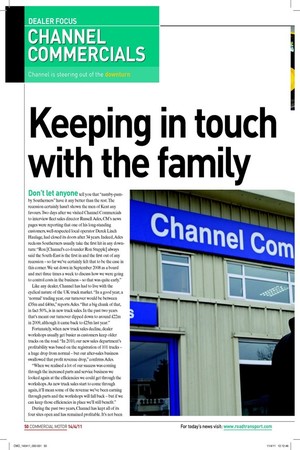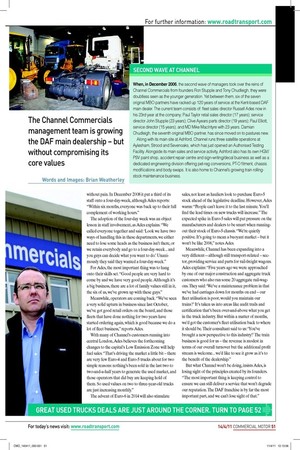Keeping in touch with the family
Page 38

Page 39

If you've noticed an error in this article please click here to report it so we can fix it.
The Channel Commercials management team is growing the DAF main dealership – but without compromising its core values
Words and Images: Brian Weatherley Don’t let anyone tell you that “namby-pamby Southerners” have it any better than the rest. The recession certainly hasn’t shown the men of Kent any favours. Two days after we visited Channel Commercials to interview leet sales director Russell Ades, CM’s news pages were reporting that one of his long-standing customers, well-respected local operator Derek Linch Haulage, had closed its doors after 34 years. Indeed, Ades reckons Southerners usually take the irst hit in any downturn: “Ron [Channel’s co-founder Ron Stupple] always said the South-East is the irst in and the irst out of any recession – so far we’ve certainly felt that to be the case in this corner. We sat down in September 2008 as a board and met three times a week to discuss how we were going to control costs in the business – so that was quite early.”
Like any dealer, Channel has had to live with the cyclical nature of the UK truck market. “In a good year, a ‘normal’ trading year, our turnover would be between £35m and £40m,” reports Ades. “But a big chunk of that, in fact 50%, is in new truck sales. In the past two years that’s meant our turnover dipped down to around £22m in 2009, although it came back to £25m last year.” Fortunately, when new truck sales decline, dealer workshops usually get busier as customers keep older trucks on the road. “In 2010, our new sales department’s proitability was based on the registration of 101 trucks – a huge drop from normal – but our after-sales business swallowed that proit revenue drop,” conirms Ades.
“When we realised a lot of our success was coming through the increased parts and service business we looked again at the eficiencies we could get through the workshops. As new truck sales start to come through again, it’ll mean some of the revenue we’ve been earning through parts and the workshops will fall back – but if we can keep those eficiencies in place we’ll still beneit.” During the past two years, Channel has kept all of its four sites open and has remained proitable. It’s not been without pain. In December 2008 it put a third of its staff onto a four-day-week, although Ades reports: “Within six months, everyone was back up to their full complement of working hours.” The adoption of the four-day week was an object lesson in staff involvement, as Ades explains. “We called everyone together and said: ‘Look we have two ways of handling this in these departments, we either need to lose some heads as the business isn’t there, or we retain everybody and go to a four-day-week... and you guys can decide what you want to do.’ Unanimously they said they wanted a four-day-week.” For Ades, the most important thing was to hang onto their skills set. “Good people are very hard to come by and we have very good people. Although it’s a big business, there are a lot of family values still in it, the six of us, we’ve grown up with these guys.” Meanwhile, operators are coming back. “We’ve seen a very solid upturn in business since last October, we’ve got good retail orders on the board, and those leets that have done nothing for two years have started ordering again, which is good because we do a lot of leet business,” reports Ades.
With many of Channel’s customers running into central London, Ades believes the forthcoming changes to the capital’s Low Emission Zone will help fuel sales. “That’s driving the market a little bit – there are very few Euro-4 and Euro-5 trucks about for two simple reasons: nothing’s been sold in the last two to two-and-a-half years to generate the used market, and those operators that did buy are keeping hold of them. So used values on two to three-year-old trucks are just increasing monthly.” The advent of Euro-6 in 2014 will also stimulate sales, not least as hauliers look to purchase Euro-5 stock ahead of the legislative deadline. However, Ades warns: “People can’t leave it to the last minute. You’ll ind the lead times on new trucks will increase.” The expected spike in Euro-5 sales will put pressure on the manufacturers and dealers to be smart when runningout their stock of Euro-5 chassis. “We’re quietly positive. It’s going to mean a buoyant market – but it won’t be like 2006,” notes Ades.
Meanwhile, Channel has been expanding into a very different—although still transport-related – sector, providing service and parts for rail-freight wagons. Ades explains: “Five years ago we were approached by one of our major construction and aggregate truck customers who also ran some 20 aggregate rail-wagons. They said: ‘We’ve a maintenance problem in that we’ve had carriages down for months on end – our leet utilisation is poor, would you maintain our trains?’ It’s taken us into areas like audit trails and certiication that’s been over-and-above what you get in the truck industry. But within a matter of months, we’d got the customer’s leet utilisation back to where it should be. Their consultant said to us: ‘You’ve brought a new perspective to this industry!’ The train business is good for us – the revenue is modest in terms of our overall turnover but the additional proit stream is welcome... we’d like to see it grow as it’s to the beneit of the dealership.” But what Channel won’t be doing, insists Ades, is losing sight of the principles created by its founders. “The most important thing is keeping control to ensure we can still deliver a service that won’t degrade our reputation. The DAF franchise is by far the most important part, and we can’t lose sight of that.”









































